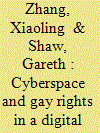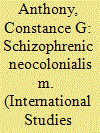|
|
|
Sort Order |
|
|
|
Items / Page
|
|
|
|
|
|
|
| Srl | Item |
| 1 |
ID:
153723


|
|
|
|
|
| Summary/Abstract |
The Association of South East Asian Nations (ASEAN) escalated its community building project significantly over the last decade, culminating in the launch of a reformed and substantially integrated ASEAN Community at the end of 2015. This article considers what might follow from this newly reformed and rhetorically people-focused version of ASEAN for matters of sexual orientation and gender identity and expression (SOGIE). In claiming to be people-oriented and people-centred, and by developing a regional rights regime, ASEAN opens itself to standards by which it can be measured and held to account. We critically review ASEAN 2025: Forging Ahead Together, and consider civil society's response, focusing on the critique offered by the ASEAN SOGIE Caucus, the peak civil society organisation for ASEAN SOGIE matters. We focus on three themes: identity, visibility politics, and rights. We argue that while ASEAN falls short of its own rhetorical standards, these same standards support a politics which keeps rights in contestation, enabling civil society to push for accountability to international standards, and a more democratic politics.
|
|
|
|
|
|
|
|
|
|
|
|
|
|
|
|
| 2 |
ID:
160504


|
|
|
|
|
| Summary/Abstract |
Owing to China’s austere censorship regulations on film media, directors of films and documentaries engaging with lesbian, gay, bisexual and transgender themes have struggled to bring their work to domestic attention. Working outside of the state-funded Chinese film industry has become necessary for these directors to commit their narratives to film, but without approval of China’s State Administration of Press, Publication, Radio, Film and Television, these artists have had little chance of achieving widespread domestic distribution of their work. However, advancements in new media technology and Web 2.0, ranging from digital video formats to Internet-based distribution via social media networks and video-hosting platforms, provide opportunities for Chinese audiences to access films and documentaries dealing with LGBT themes. This empirical study assesses how production, promotion and consumption of queer documentary films are influenced by the development of social media within Chinese cyberspace. Through close readings of microblogs from SinaWeibo, this study combines analysis of contemporary research with digital social rights activism to illustrate contemporary discourse regarding film-based LGBT representation in China. Finally, the study comments on the role that documentary filmmaking plays in China’s gay rights movement, and discusses the rewards (and challenges) associated with increased levels of visibility within society.
|
|
|
|
|
|
|
|
|
|
|
|
|
|
|
|
| 3 |
ID:
181923


|
|
|
|
|
| Summary/Abstract |
This brief essay meditates on the advent of the ideal of horizontal social relations, exemplified in the early CCP years in the political term, “comrade” (tongzhi). It takes up Qu Qiubai as exemplary of a Marxist political thinker whose commitments to horizontality/comrade relations can be illustrated through his theories of literature, translation and language. It proposes that despite Xi Jinping's recent rhetorical admonishments to re-activate “comrade” as a political term, it is the LGBTQ community's appropriation of “comrade” in contemporary China that actually holds the potential for a substantive reanimation of the utopian ideals begun a century ago.
|
|
|
|
|
|
|
|
|
|
|
|
|
|
|
|
| 4 |
ID:
188586


|
|
|
|
|
| Summary/Abstract |
In 2019, the government of Taiwan legalized same-sex marriage, the first to do so in Asia. Yet, despite its celebration as a sign of liberal progress, legalization appears at odds with the results of referendums that show a majority of Taiwan citizens oppose LGBTQ acceptance, following a steady decline in tolerance for LGBTQ people in Taiwan. To explain this, this article adopts a Goffmanian micro-sociological approach to interrogate LGBTQ experiences of stigma and discrimination in their networks. Using narrative and go-along interviews with LGBTQ people in Kaohsiung, Taiwan in 2019, this article shows (1) latent forms of discrimination in families and at workplaces, (2) the intensification of discriminatory scrutiny within these spaces in the wake of legalization, (3) mental health consequences, and (4) social enclaves that offer some reprieve from discriminatory pressures. This article identifies a need for greater resource allocation to create safe spaces for members of the LGBTQ community and anti-discrimination policies to combat the capillary forms of discrimination that have arisen after same-sex marriage legalization.
|
|
|
|
|
|
|
|
|
|
|
|
|
|
|
|
| 5 |
ID:
162651


|
|
|
|
|
| Summary/Abstract |
US foreign policy on AIDS assistance in Africa has gone through many shifts in resource investment and focus, reflecting the politics of the culture war in the United States. Because AIDS cannot be addressed without consideration of sexuality, these shifts have resulted in very different sets of recommendations in African countries on sexual behavior and values. Because they are dependent on the United States for material and technological resources, African countries have been incorporated into this cultural debate as a form of sexual and cultural neocolonialism.
|
|
|
|
|
|
|
|
|
|
|
|
|
|
|
|
|
|
|
|
|